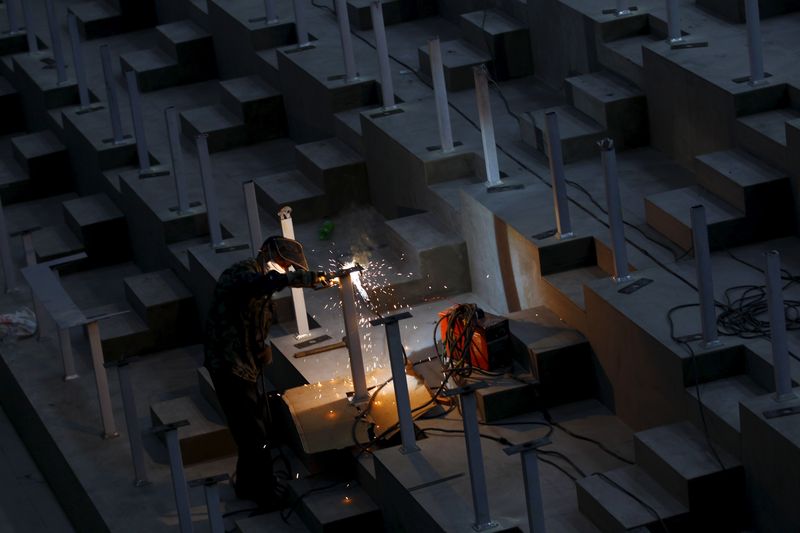China cuts key rates as industrial output, retail sales growth miss forecasts
2023.08.14 23:01
2/2

© Reuters. FILE PHOTO: A worker welds at a market under construction in Kunming, Yunnan province, August 12, 2015. REUTERS/Wong Campion/File Photo
2/2
BEIJING (Reuters) – China’s July industrial output and retail sales growth slowed and undershot forecasts, adding to a raft of recent weak data, suggesting policymakers may need to step up support measures to shore up a faltering economy.
Less than an hour before the data release, China’s central bank did just that as it unexpectedly cut key policy rates for the second time in three months, underlining the rapid loss of the post-COVID economic rebound.
Industrial output grew 3.7% from a year earlier, slowing from the 4.4% pace seen in June, data released by the National Bureau of Statistics (NBS) showed on Tuesday. It was below expectations for a 4.4% increase in a Reuters poll of analysts.
Retail sales, a gauge of consumption, rose 2.5%, down from a 3.1% increase in June and missed analysts’ forecasts of 4.5% growth despite the summer travel season. It was the slowest growth since December 2022.
Policymakers last month released a batch of stimulus measures, from boosting auto and home appliances consumption, relaxing some property restrictions to pledging support to the private sector, as a post-COVID rebound lost steam since the second quarter.
However, the persistent drag in the property sector, mounting local government debt pressure, high youth jobless rate and cooling foreign demand continue to be major impediments to fostering a sustainable economic revival.
Tuesday’s figures suggest the broader economy remained underpowered last month and come on top of a batch of gloomy data over the past week including disappointing trade and consumer price numbers as well as record-low credit growth that underline the need for policymakers to provide more support measures.
Fixed asset investment expanded 3.4% in the first seven months of 2023 from the same period a year earlier, versus expectations for a 3.8% rise. It grew 3.8% in the January-June period.
Investment in the property sector tumbled 8.5% year-on-year in January-July, after shrinking 7.9% in January-June.
Demand for the property sector, once a pillar of economic growth, has remained weak in recent weeks. The Politburo, a top decision-making body of the ruling Communist Party, said last month it is necessary to adapt to significant changes in market supply and demand and optimise property policies in a timely manner.
The nationwide survey-based jobless rate climbed slightly to 5.3% from 5.2% in June.
($1 = 7.2838 renminbi)








